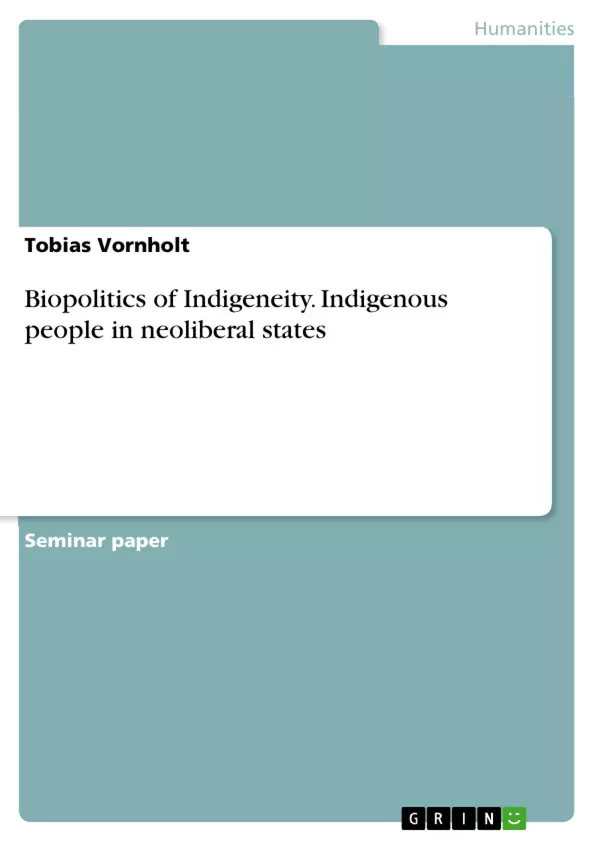This essay shows that indigenous people are not recognised enough and suffer from neo-colonial measures. It will pick up Merlan’s (2009) applied definition of Rowse for "recognition": It is the organized representation of population, land, and customary law. Not all indigenous peoples are marginalized, though, and progress in terms of recognition has been made. The ontogenesis of indigenous movements was favoured by the establishment of legal acts in the wake of minority rights after the Second World War, and since then there is an overall bias towards improvement.
Inhaltsverzeichnis (Table of Contents)
- Introduction
- Neoliberalism as state Paradigm
- The role of the market logic in neoliberalism
- Compromise replaces idealism
- Multiculturalism
- Perceptions of indigeneity
- Status Quo
- Case studies
- The need to accept the UN declaration of 2007
- Indigeneity on the way to recognition
- Conclusion...
Zielsetzung und Themenschwerpunkte (Objectives and Key Themes)
This paper seeks to raise awareness for the problematic situation of indigenous people in neoliberal states and show the contexts in which they suffer from non-recognition and neo-colonial adaptation. The author argues that indigenous people are not sufficiently recognized and suffer from neo-colonial measures, despite some progress in terms of recognition. The paper aims to examine the framework in which states operate, specifically neoliberalism, and explore its impact on the political situation of indigenous people.
- Neoliberalism and its effects on indigenous communities
- The challenges of defining indigeneity and achieving recognition
- The role of multiculturalism in neoliberal states and its limitations
- The significance of the UN declaration of 2007
- Case studies of indigenous communities facing marginalization and non-recognition
Zusammenfassung der Kapitel (Chapter Summaries)
- Introduction: This chapter introduces the topic of indigenous people in neoliberal states and explores various definitions of indigeneity, highlighting the challenges of defining and recognizing indigenous communities. The author emphasizes the need to recognize indigenous people as such if they identify as indigenous and have a different cultural heritage. This chapter also sets the stage for the paper's main objective, which is to raise awareness for the problematic situation of indigenous people and demonstrate the effects of non-recognition and neo-colonial adaptation.
- Neoliberalism as state Paradigm: This section delves into the principles of neoliberalism and its impact on state governance. It examines how neoliberal policies, influenced by market logic, shape the relationship between the state and its citizens. The chapter also discusses the idea of multiculturalism within neoliberalism, arguing that while it acknowledges cultural rights, it can also create a hierarchy based on racial and cultural differences.
- The role of the market logic in neoliberalism: This sub-section focuses on the central role of market logic in neoliberal policies, where the state prioritizes economic growth and efficiency. It examines how this can lead to the commodification of even basic necessities like water and the potential for marginalization of groups who don't contribute to market value.
- Compromise replaces idealism: This sub-section explores the tension between neoliberal ideals of democracy and the reality of governing through compromise. It examines how neoliberal governance emphasizes negotiation and pragmatic solutions over utopian ideals, potentially resulting in a trade-off between recognition and compliance with existing economic and political structures.
- Multiculturalism: This sub-section discusses the role of multiculturalism in neoliberal states, highlighting the potential for both recognition and continued inequality. It examines how, despite acknowledging cultural rights, neoliberal policies can still reinforce existing racial and cultural hierarchies.
- Perceptions of indigeneity: This chapter explores different perspectives on defining and understanding indigenous people. It examines how the concept of indigeneity has been framed by different actors, including the UN, state governments, and indigenous communities themselves.
- Status Quo: This chapter analyzes the current situation of indigenous people in neoliberal states, focusing on their experiences of marginalization and non-recognition. It explores the various challenges faced by indigenous communities in navigating neoliberal policies and seeking recognition.
Schlüsselwörter (Keywords)
This paper focuses on the complex interplay between neoliberalism, indigeneity, recognition, and marginalization. It examines the impact of neoliberal policies on indigenous communities and explores the challenges of achieving recognition within a framework that often prioritizes economic growth and efficiency over cultural rights. The paper also highlights the importance of understanding the diverse perspectives and experiences of indigenous peoples in different contexts.
Frequently Asked Questions
How does neoliberalism affect indigenous people?
Neoliberalism often prioritizes market logic and economic efficiency, which can lead to the marginalization of indigenous communities and the commodification of their resources.
What is the significance of the 2007 UN Declaration?
The UN Declaration on the Rights of Indigenous Peoples is a key milestone for recognition, establishing international standards for their protection and cultural rights.
Can multiculturalism be problematic in neoliberal states?
Yes, while it acknowledges cultural rights, it can sometimes create hierarchies or be used as a tool for neo-colonial adaptation rather than true recognition.
How is "recognition" defined in this context?
Following Rowse and Merlan, recognition involves the organized representation of an indigenous population, their land, and their customary law.
What are the challenges in defining indigeneity?
Defining indigeneity is complex because it involves self-identification, distinct cultural heritage, and often a history of displacement by colonial powers.
- Arbeit zitieren
- Tobias Vornholt (Autor:in), 2015, Biopolitics of Indigeneity. Indigenous people in neoliberal states, München, GRIN Verlag, https://www.hausarbeiten.de/document/1286425


